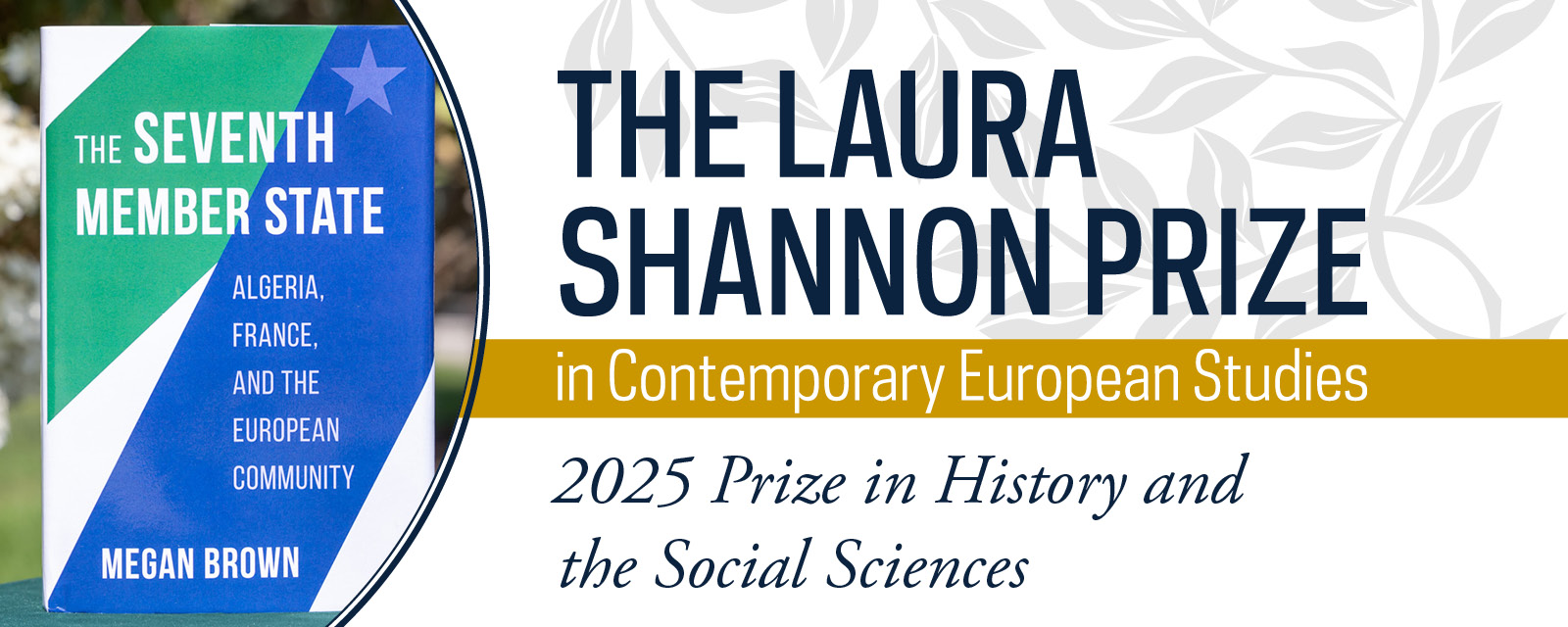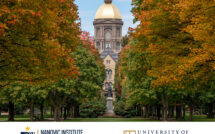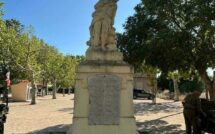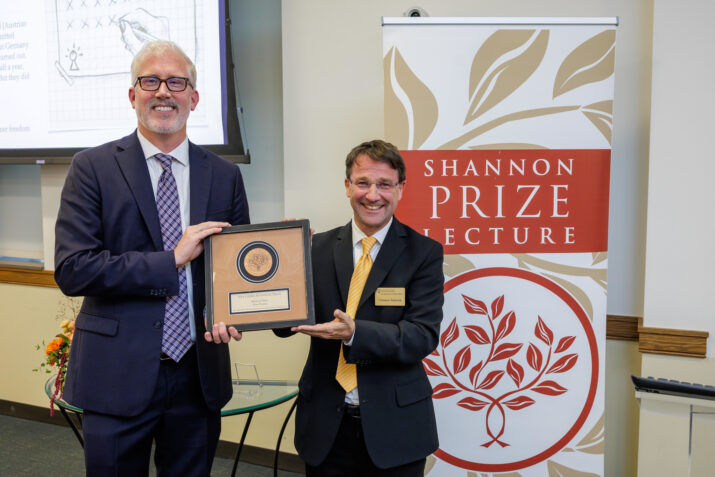
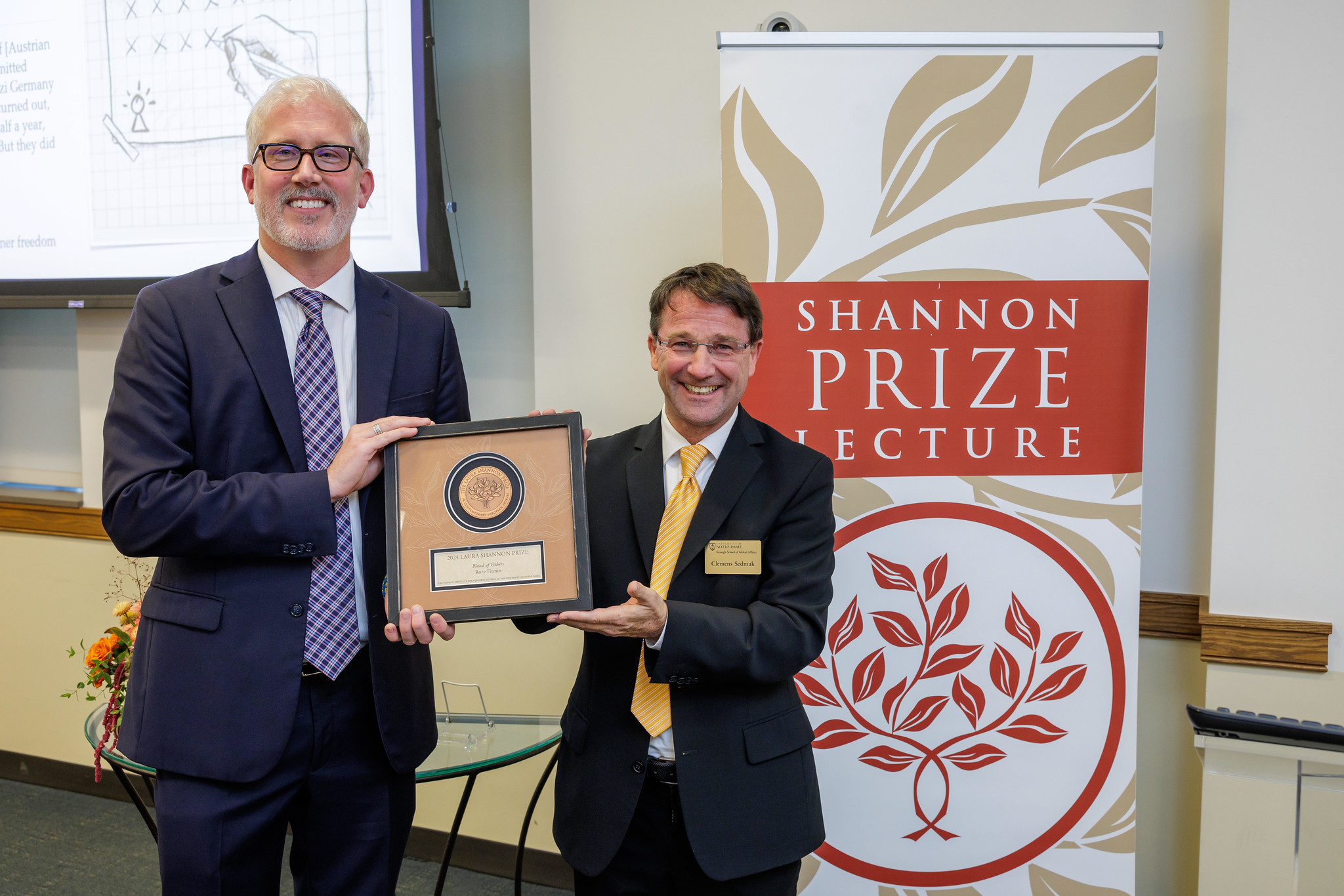
By Rory Finnin, University of Cambridge
In 2024 the Laura Shannon Prize in European Studies offered me something precious and even unexpected: a sense of community. Its greatest reward is a closer relationship with the students and scholars at Notre Dame’s Nanovic Institute. In this sense, the annual Prize is not time-bound at all. It promises engagement and connection for an entire career.
Being considered and shortlisted for such a prize is reward enough. Winning it involved a 2023 Christmas call with Professor Clemens Sedmak, the Institute’s visionary Director, and included an invitation to give the annual Laura Shannon Prize Lecture in the autumn of 2024. What impressed me from beginning to end was the warmth, professionalism, and sense of purpose in every interaction with the Nanovic team. Europe is in a perilous moment in history, and studying the continent requires academic rigor and emotional sensitivity. To a person, our colleagues in the Nanovic Institute embody these attributes while imparting a sense of defiant optimism about the future.
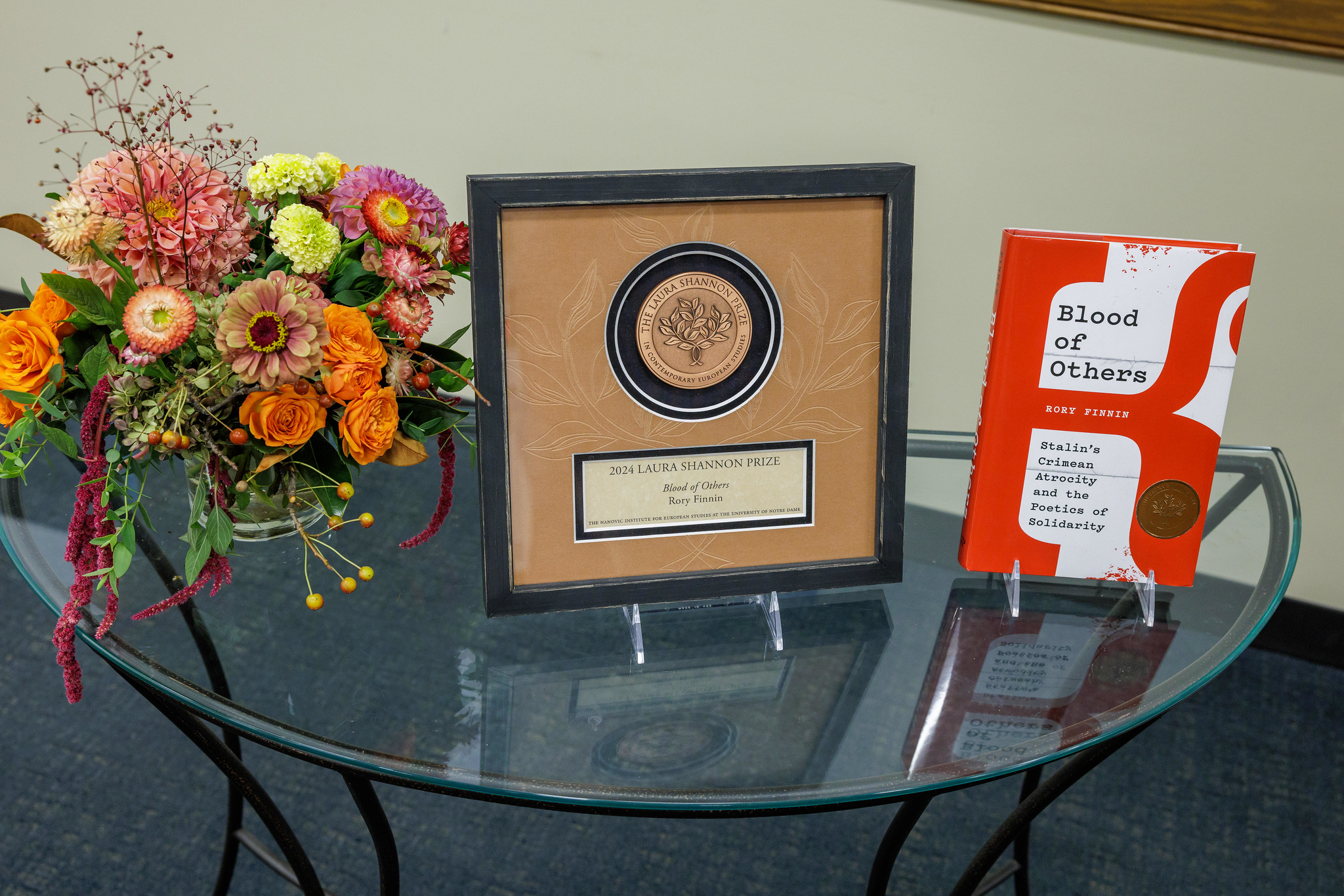
Ukraine is part of the reason why. For decades Notre Dame has worked closely with the pioneering Ukrainian Catholic University, forging institutional partnerships and innovative scholarly collaborations. For the Nanovic team, the concept of Ukrainian resistance to Russian aggression has never been abstract. It is something they have witnessed in the work of their Ukrainian colleagues for many years. Today it drives the development of Nanovic’s dynamic new Ukrainian Studies Hub, which promises to reshape European Studies in the United States for generations to come.
When I arrived in South Bend to deliver the Laura Shannon Prize Lecture, Ukraine was at the center of my discussions with Notre Dame’s students and scholars. The program for my visit was chock full of lunches, dinners, and brainstorming meetings, allowing me to see so much of the Nanovic community in action. Class visits were a highlight. With graduate students, I spoke about my book Blood of Others: Stalin’s Crimean Atrocity and the Poetics of Solidarity (2022); with undergraduates, I discussed the interplay of culture and civil society in wartime Ukraine. To explore so many aspects of a university’s vibrant academic environment over an extended period is all too rare. It was an invigorating experience.
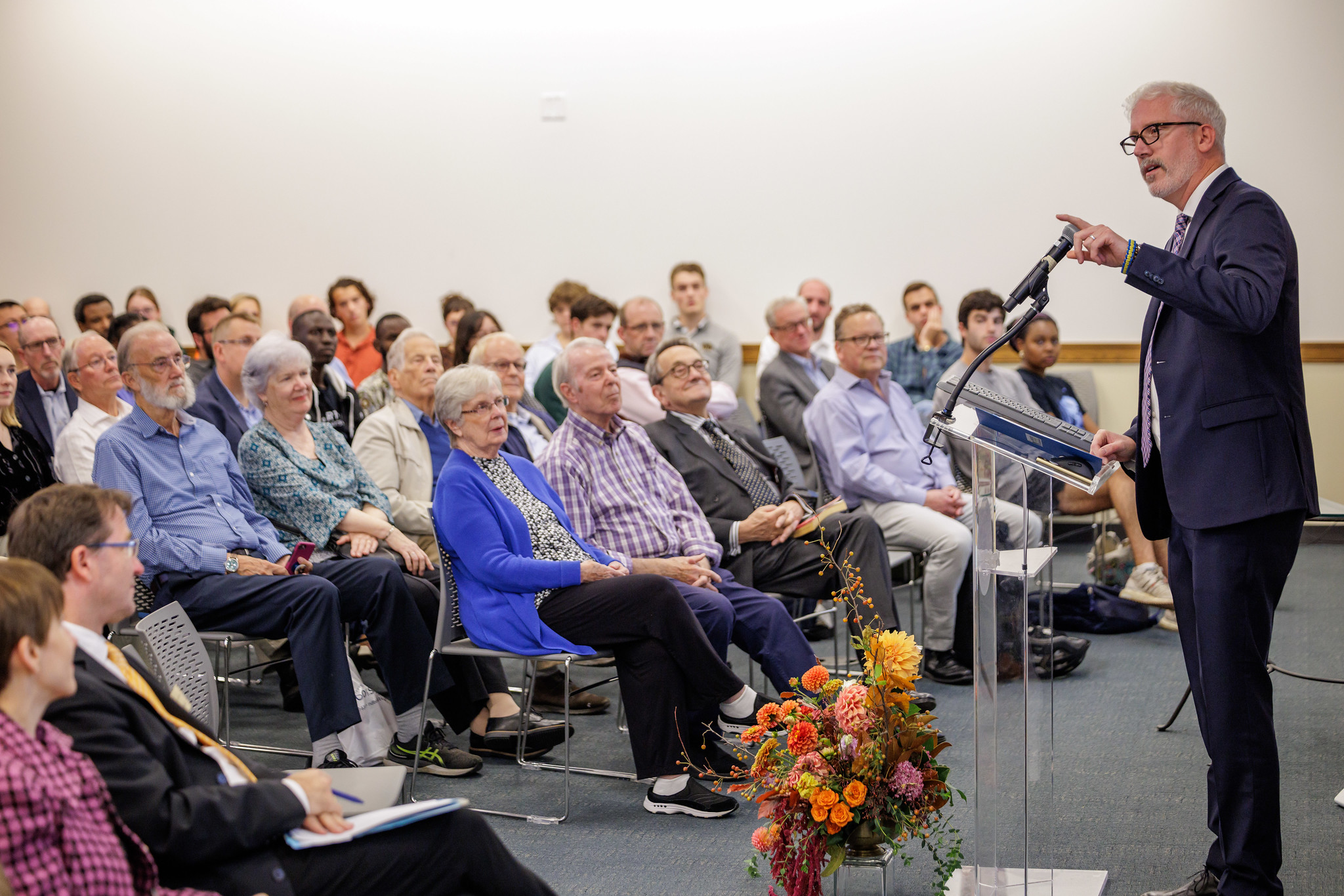
My visit culminated with the Laura Shannon Prize Lecture, whose title was an admonition: “We Need to Talk about Crimea.” After reflecting on the reasons for our failure to keep Crimea at the forefront of scholarly attention after Putin’s annexation operation in 2014, I brought to the fore understudied examples of local resistance to Russian occupation, especially among the peninsula’s indigenous Sunni Muslim people, the Crimean Tatars. These acts of resistance often leverage ideas and messages encoded in texts of poetry and prose, reminding us of the abiding value of work in the humanities to our study of contemporary geopolitics. With its interdisciplinary and transnational outlook, the Laura Shannon Prize has never lost sight of this value. Like the Nanovic Institute as a whole, it is a catalyst of intellectual invention.
Author bio:
Rory Finnin is professor of Ukrainian studies at the University of Cambridge. He launched the Cambridge Ukrainian Studies program in 2008. Finnin’s primary research interest is the interplay of culture and identity in Ukraine. His broader research interests include nationalism studies, solidarity studies, and cultural memory in the region of the Black Sea. Finnin is a graduate of St Ignatius High School (Cleveland), Georgetown University (B.A.), and Columbia University (Ph.D.). In 1995-97 he served as a U.S. Peace Corps volunteer in Ukraine.
The Laura Shannon Prize in Contemporary European Studies is a well-known and respected book prize within the field of European studies. Awarded by a prize jury of accomplished scholars each year, it carries an award of $10,000 and the opportunity to present at the University of Notre Dame. It alternates each year between two broad disciplinary areas: humanities and social sciences/history.
Now in its 16th year, the Laura Shannon Prize is made possible through a generous endowment from Laura Shannon (1939-2021) and her husband, Michael, Notre Dame class of ’58. Laura Shannon joined the Nanovic Institute’s advisory board in 2003 and served skillfully for many years. As well as her work in social services and family court mediation, she was a regular visitor to Europe, particularly France where she honed her language skills and explored libraries and cultural centers. Claire Shannon Kelly and Katie Shannon carry on their parents’ legacy as members of the institute’s advisory board.
As of this publication, nominations are currently being accepted for the 2026 prize through February 28, 2025. Books in the humanities published in 2023 or 2024 are eligible.
The 2025 prize in history and the social sciences has already been announced; Megan Brown, associate professor of history at Swarthmore College, has received this award for her book The Seventh Member State: Algeria, France, and the European Community (Harvard University Press, 2022). Her prize lecture will be scheduled for the 2025-26 academic year.
